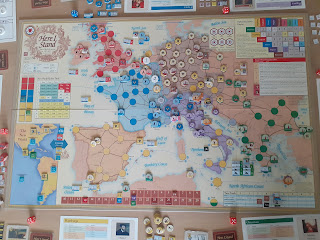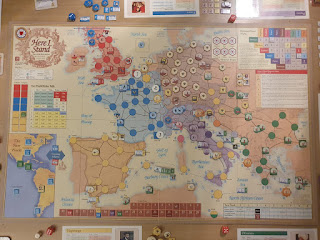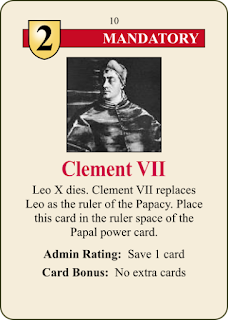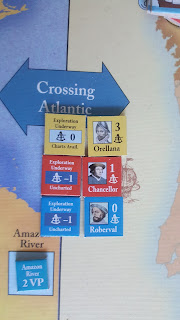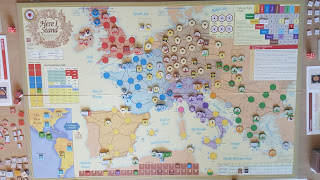Diplomatic situation:
The Ottomans are at war with the Papacy
The Habsburgs are at war with England
The Habsburgs are at war with the Protestants
The Papacy is at war with the Protestants
The Hapsburgs are allied with Hungary-Bohemia
France is allied with Genoa
France is allied with Scotland
The Papacy is allied with Venice
Victory points:
England 13
Protestants 16
Hapsburgs 19
France 20
Ottomans 20
Papacy 20
Protestant spaces: 20
(victory points Papacy 9 - Protestants 6)
Electorates: 5 Protestant, 1 Catholic
Protestant English home spaces: 1 (0 VP)
Cards removed from the game:
Luther's 95 Theses
Peasants' War
Barbary Pirates
Defender of the Faith
Clement VII
Paul III
Marburg Colloquy
Michael Servetus
Calvin Expelled
Augsburg Confession
Julia Gonzaga
Schmalkaldic League
Explorers removed: Narváez (-1)
We start, as always, with the card draw phase. All the naval units destroyed last turn are returned to their owners and can be rebuilt, and the reformer Calvin returns to Geneva from exile.
The Reformation continues: as a result of Henry VIII's marriage to Anne Boleyn last turn, the English Reformation is now on. The reformer Cranmer appears in London, flipping it Protestant and giving England their first Protestant Home Spaces VP, for a total of 14. Cranmer also joins the game as a debater, along with Coverdale and Latimer. The papal ranks are reinforced by Carafa and Pole, and a total of ten new cards are added to the deck, including the mandatory event Society of Jesus, Copernicus and the Spanish Inquisition.
Before dealing cards, we work out New World riches for the Habsburgs and French. The Spanish roll a seven for their colony in Cuba, which ends up as a result of 8 due to Plantations, so they get a card, and another card from their Aztec conquests; the French get a card from Charlesbourg Royal.
So the total cards everyone starts the turn with are as follows:
Ottomans: dealt 5, kept 2, total 8
Hapsburgs: 7, 2, 10
English: 4, 1, 6
French: 6, 1, 8
Papacy: 5, 1, 8
Protestants: 5, 1, 7
**
And then it's time for the diplomacy phase. The negotiation segment had to be extended when one player's laptop screen broke, but eventually, after some exchanges of diplomatic missives, I got things started by announcing an Ottoman alliance with France. The Habsburgs also announce an alliance with France, and grant them a card draw! England then announces an alliance with France, because of course they do, at the price of one French mercenary unit transferred to their control, as well as an alliance with the Protestants.
For their part, the French confirm the Ottoman and Habsburg alliances, as well as the Habsburg card draw, and announce an alliance with the Vatican! France loans the Genoan naval squadron and Andrea Doria, and transfers four units of mercenaries, all to the Papacy, and in exchange the Pope cedes Florence to the French. The alliance with England is declined. The Vatican confirm the agreement, and the Protestants confirm their alliance with England. France now leads with 22 VP!
The Habsburgs decline to sue for peace with England, and declare war on the Ottomans; the French cap off a very succesful diplomacy phase by declaring war on the English. We're running out of diplomatic counters!
The Habsburgs pay for their declaration of war with Mercenaries Demand Pay, and France with A Mighty Fortress. The French then play Venetian Informant for the third time in the game, this time looking at the English hand.
I spring deploy Suleiman and three Ottoman regulars to Buda, and the Habsburgs decline to deploy. Henry VIII travels to Calais with three mercenaries and two regulars, and the French deploy Francis, Montmorency, four regulars and four mercenaries to Boulogne. The Papacy finishes spring deployment by sending four mercenaries to Ancona.
**
The Ottomans start the action phase with John Zápolya, meaning I now have an army of eleven regulars at Buda. The Habsburgs retaliate by recruiting two regulars at Vienna with City State Rebels, and England plays Janissaries Rebel for command points to deploy their fleet: two squadrons from Bristol to the Irish Sea, two squadrons from Calais to the Channel and a squadron from London to the North Sea. Following this, Brandon and his army march from Antwerp to Calais.
France plays their home card and rolls on the château table with maximum bonuses, but rolls a 2, so they draw one card and go up to 23 VP. The Papacy plays Pirate Haven for 3 CP, deploying their fleets from Venice and Rome and burning books in German. Utilizing Tetzel's bonus to add 1 CP to the St. Peter's track, the Vatican returns Strasbourg to Catholicism but strikes out in Münster. The Protestants play Unsanitary Camp as an event in Vienna, causing the Habsburgs to lose four regulars.
As the Ottomans, I play Dissolution of the Monasteries for command points. My fleet in Coron moves to the Aegean and Barbarossa's navy in Corfu deploys into the Ionian Sea. The papal fleet in the Adriatic Sea successfully intercepts; in the ensuing combat, I roll 11 dice and score 3 hits, sinking one Venetian squadron, and the Papal fleet gets five hits with six dice, destroying both my squadrons and a corsair. Barbarossa withdraws into the Aegean, and I use the remaining command points to build my last fleet at Coron and take control of Szegedin.
The Habsburgs play Calvin's Institutes for command points, building a regular in Prague and Innsbrück, as well as a mercenary in Vienna. England play their home card, Six Wives of Henry VIII, and the roll on the marriage chart is a 5: Edward is born sickly, and England gets 5 VP, catapulting them to a total of 19. Further, since Edward's mother was Anne of Cleves, both the English and the Protestants draw a card.
The French play Affair of the Placards for command points, moving their fleet in Marseille to sea and marching the two regulars in Genoa to Florence. The Vatican plays Book of Common Prayer, moving their fleet in Ancona to the Adriatic and building St. Peter's. The Protestants play Zwingli Dons Armour for command points: Philip of Hesse besieges the electorate of Trier, the Protestant regular in Brandenburg marches to Wittenberg, and Tyndale finishes translating the New Testament into English, generating six reformation attempts in the English language zone. Staggeringly, every single one of them succeeds, equalizing the Protestants and the Papacy at 17 VP each and taking England to 22!
On my impulse, I play Erasmus for command points, and engage the Venetian fleet in the Ionian Sea again. This time, after failed papal interception and avoid battle attempts, we're victorious, but only sink one of the two enemy fleets; the survivors retreat to the Adriatic. Barbarossa pursues them, and we finally destroy the rest of the Venetian navy for the loss of another corsair. A third naval move regroups my fleet in the Ionian.
The Habsburgs play Pilgrimage of Grace for command points, continuing an impressive streak of religious events not played as events, to recruit a mercenary in Innsbruck and send an explorer to the New World. England plays the mandatory event Imperial Coronation, which has no effect as Charles V is in Vienna, and marches their army from Calais to Boulogne. The French choose to avoid battle and retreat to Boulogne, but they fail. In the field battle, both armies manage to score a grand total of three hits, which means both sides lose three mercenaries, the French defenders win, and the English retreat back to Calais. They use their other command point to recruit a mercenary there.
For their part, the French play War in Persia for CP, withdrawing their army from Boulogne to Paris, sending Montmorency and two mercenaries to Rouen, and recruiting a Scottish regular in Glasgow. The pope plays Unpaid Mercenaries and uses the command points to build St. Peter's, which gets them their fourth St. Peter's victory point for a total of 18 VP. The Protestants retaliate with Mercenaries Bribed, starting a debate in German against the only committed Papal debater, Tetzel. The Protestant debater is Melanchton, and he absolutely destroys his opponent: the Protestants win by four hits to none, meaning Tetzel is disgraced and four German-speaking locations convert to Protestantism. The Protestants flip Regensburg, Salzburg, Innsbrück and Linz, and all this swings the victory points their way: the Papacy now has 16 VP and the Protestants 20.
The Ottomans play Gout for command points, attempting piracy in the Ionian Sea. We score one hit, and the Habsburgs award us a piracy VP, for a total of 21 VP. On the Habsburg impulse, it turns out that none of us were expecting the Spanish Inquisition.
There are no Protestant Spanish-language spaces (are there ever?), but the Habsburgs make the English discard Fountain of Youth and draw a card for themselves. The debate ends up being Carafa against Luther himself, and the Catholics win it by one hit, converting Worms. This again changes the victory points, putting the Papacy at 17 and the Protestants at 19. Incensed at losing a card, the English play Shipbuilding for command points, recruiting a mercenary at Calais and then marching their entire army in Calais to Brussels; the Habsburg garrison withdraws into the fortifications.
At this point France plays Swiss Mercenaries as a response, placing one in Florence and three in Carlisle, followed by Scots Raid.
France builds a Scottish regular in Glasgow, and marches the stack of five units there to Carlisle. The English decline to intercept, so the Scots march on to York and launch their assault. Neither side scores any hits, so now the siege is on. They then use the command points from the event to send an explorer to the New World.
The Papacy plays Leipzig Debate, nominating Eck as their attacker and targeting an uncommitted German debater. It ends up being Eck versus Karlstadt again, and the hits are 3-0 to the Papal side. That means Karlstadt is burned at the stake! The Papacy flips Nürnberg, Regensburg and Leipzig; they gain 1 VP from this and 1 VP from Karlstadt, going up to 19 VP, while the Protestants drop to 18.
For their part, the Protestants play Master of Italy. Since France controls Milan, Florence and Genoa, they go up to 24 VP! The Protestants use the command points to storm Trier, unsuccesfully, and move a regular from Augsburg to Worms. I play Revolt in Egypt for command points, move Barbarossa's fleet to the Adriatic and piratize the Papacy there. We score one hit, netting one piracy VP for a total of 22.
Meanwhile, the Habsburgs go on the offensive! They play Gabelle Revolt for one CP and march Charles, the Duke of Alva and their entire stack in Vienna to Pressburg. Suleiman attempts an intercept with the Ottoman stack in Buda and succeeds. The battle of Pressburg is a tremendous slaughter, with the Ottomans losing five regulars and the Habsburgs seven units. The Habsburg survivors retreat to Vienna.
The English play Machiavelli: the Prince for command points, and storm Brussels: both sides lose one mercenary and the siege continues. They also send one of their regulars from Edinburgh to besiege Stirling, and the French mercenary at Glasgow fails to intercept them. This cuts the French line of communication to York. The other English regular at Edinburgh then attacks the French mercenaries at Glasgow, but neither side scores any hits and the English retreat back to Edinburgh. France then plays Treachery! and conquers York! The French now have 26 victory points, which means the game will end this turn unless someone drops them back below 25.
The Pope plays Rough Wooing for command points, sending Andrea Doria and the Genoan fleet into the Barbary Coast and building St. Peter's for two CP. The Protestants play Trace Italienne to initiate a debate in the German language zone. The matchup ends up being Büllinger versus Eck, so the Protestants swap in Luther and draw a card with Here I Stand. The first round ends in a tie, and in the second round, Campeggio beats Oekolampedius by two hits, flipping Kassel and Lübeck.
For my part, I play my home card to place four regulars in Istanbul. With France past the victory threshold, there's not a lot I can do except hope that there's a next turn and I can have a shot at winning this. On that note, the Habsburgs play Andrea Doria as an event: both they and the Papacy draw a card, but luckily I lose none of my piracy VPs.
With only one card left, there's nothing England can do to evict the French from York, and they skip their impulse. France plays Colonial Governor / Native Uprising for command points, recruiting a mercenary in St. Dizier and returning their ships in the Gulf of Lion to Marseille. The Pope plays Knights of St. John for command points to finish building St. Peter's, taking them to 20 VP. The Protestants play Katherine Bora to start translating the New Testament into French.
As the Ottomans, the French victory seems inevitable at this point, so I pass. The Habsburgs play Philip of Hesse's Bigamy as an event, forcing the Protestants to either discard a random card or remove the bigamist from play. They discard Surprise Attack. England skips their impulse, and so does France. The Papacy plays Papal Bull, excommunicating Zwingli and choosing to debate an uncommitted Protestant in German. Aleander faces Oecolampadius, and wins by one hit to none. With Aleander's special ability, that means Salzburg and Kassel flip Catholic. The Protestants and Ottomans skip their impulses, and the Habsburgs play their home card for command points. They recruit four mercenaries in Vienna, and Charles again leads his forces to Pressburg. In the ensuing battle, all four mercenaries are lost for three Ottoman casualties, and the Habsburgs withdraw back to Vienna. England and France skip their impulses, and the Papacy plays Mercenaries Grow Restless to recruit a regular in Rome. Then everyone skips, ending the action phase.
Because it was obvious the game would end this turn, we skipped the winter phase and went straight on to the New World. The Habsburg and French explorers ended up being Roberval and Magellan, and while Roberval returned empty-handed, Magellan completed a succesful circumnavigation! This earned the Habsburgs 1 VP for the Pacific Straits and 3 for the circumnavigation, catapulting them into second place. It's not enough to change the outcome, though, and the game ends in a French victory.
Here's the final score:
Protestants 17
England 20
Papacy 21
Ottomans 22
Hapsburgs 23
France 26
**
We got Turn 5 started on May 14th 2021, and the diplomacy phase ended on June 22nd. The action phase kicked off on July 20th, and ran for the rest of the year and then some. Prince Edward was born on August 30th, and Tyndale published his New Testament on September 22nd. Karlstadt was burned on December 20th, and York fell on the first of February 2022. By the time Zwingli was excommunicated, the turn had taken a full year. The action phase and the game ended on Monday, the 11th of July: two years, three months and some days since Luther's 95 Theses hit the table on March 22nd 2020.
**
Well, that was certainly an epic experience in the proper sense of the word. As one of our players put it to me, the delay between sending out your "orders" and finding out what happened made for a real feeling of grand strategy. I'm delighted we performed this experiment, and want to thank everyone who participated.
I have to say I still have mixed feelings about this last turn. I'm not taking anything away from the French player: they saw a shot at a win, and combined some very skilful diplomacy with getting everything out of the cards they were dealt to take it. So I consider this an absolutely deserved win. It did involve running some considerable risks, though. There were several cards that could have derailed the French win completely: any of the cards affecting mercenaries would have been difficult for the thinly stretched French to deal with, and something like Diplomatic Marriage, City State Rebels or Andrea Doria could have knocked out a key, leaving them short of the 25 VP needed for the win.
The thing is, nearly all of those cards were in play this turn, and none of them were used against the French, even when it became clear that they were winning. We've played Munchkin, where as soon as someone starts pulling ahead, everybody piles on them; this was somehow exactly the opposite experience. With my cards and board position, there was very little I could do except hope there would be a sixth turn, where I think all of us would have had a shot at the win. Several players could have done something to stop the French. The Habsburgs could have dropped France below 25 VP and put themselves in a position to win with a successful circumnavigation - which, we know with hindsight, they would have got. The play of Andrea Doria against my Ottomans, as opposed to deactivating Genoa, amounted to throwing the game to the French. I still don't quite know how I feel about that.
Having said that, I'm reasonably happy with my strategy. My experience in our first game was that if the Ottomans come out swinging, everyone else will mobilize against them, and I wanted to avoid that. What's perhaps slightly boring about the Ottomans, purely in an abstract strategy game sense, is that you've got very few options other than fighting the Habsburgs. I tried fighting the Papacy, and I don't mind telling you I was unpleasantly surprised by Venetian Alliance! I was unlucky on some key naval combat rolls, otherwise I think I might have done better in the Mediterranean. I was also quite lucky on my piracy rolls, and managed to grab Julia Gonzaga as well. I feel that if there had been one more turn, I'd have had a pretty good shot at winning, but it wasn't to be.
**
So, now that that's done, I've put in a P500 order for Virgin Queen. Again, I want to thank everyone who took part; we'll be back.





















